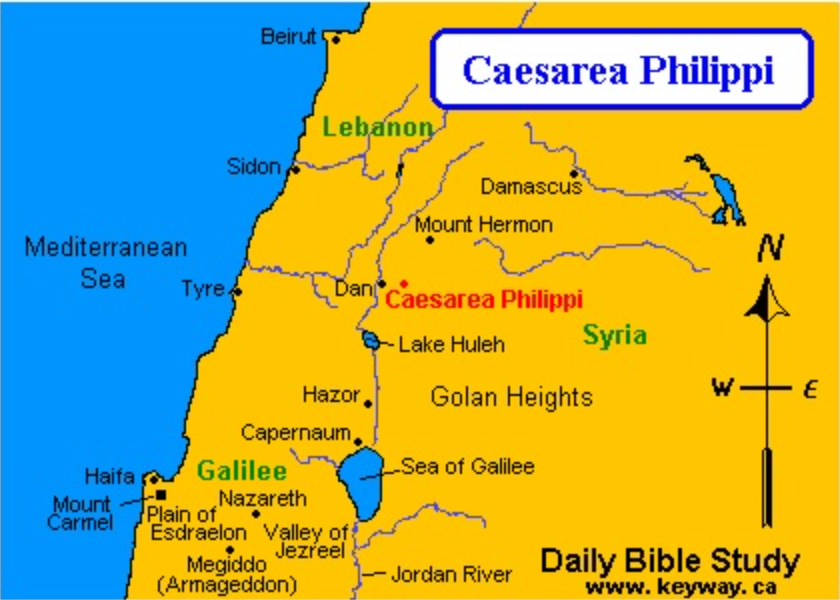
We may have possibly recently gone to a Zoom meeting where one of the first questions may be: “Can you just say who you are?“. How might you respond? Often in the New Testament, we find the disciples struggling to grasp who exactly is Jesus, despite all of that they’ve seen. Jesus keeps pressing: “Who am I to you?“
It’s like we need to hear something, rather than see it for ourselves, to really believe it. Odd that, given our devotion to social media.
This week’s Lectionary lesson (Matthew 16:13-20) has a number of opportunities where people are asked who Jesus is to them.
Caesarea Philippi – the place not to be seen!
Jesus has moved on from Bethsaida, if we take Mark’s account as an indicator. He is now in Caesarea Philippi, a ‘red-light’ area where pagan worship(*) was prominent where people believed there was a gate to the underworld. Jews may have been aghast to even be there!

We are in an area that received a strong response, culminating in the fall of Kingdom of Israel following King Jeroboam creating shrine’s at various places including at Dan. Herod Philip, one of the tetrarchs, was to build a city on the site of Caesarea Philippi but the locals continued to worship pagan gods, including Pan.
Who is Pan?
Pan was half human, half god, a fertility god, whom is also known as the universal ‘All God’ [1]. What a backdrop for Jesus to speak to the disciples!
Interestingly, according to some scholars, the name Pan comes from the Greek word Paon, meaning “shepherd” or “keeper of flocks” The word is also the root of our word “pasture” and hence is related to “pastor” [2]. If Jesus asks “Who am I to you?“, would these terms relate then?
So who is Jesus?
You might be able to imagine Jesus walking along a road, breaking some silence, keeping people alert, and asking the question: “Who do you say that I am?” I’m feeling the disciples looking at the track and wondering what to say now… Eventually they respond with “John the Baptist, others say Elijah and others Jeremiah or one of the prophets.”
I wonder whether Jesus’ shoulders might have sagged at this point – they still don’t get it! It’s a simple question: “Who am I to you?“
It’s odd that Matthew is the only New Testament letter which mentions Jeremiah: Matthew 2:17, Mathew 16:14, and Matthew 27:9 (a prediction of Jeremiah relating to Judas’ betrayal).
Eventually, Simon Peter declares “You are the Christ (or Messiah), the Son of the Living God“. In Mark’s version his response is “You are the Christ“; and in Luke’s account, “The Christ of God“.
Messiah is a word that can mean the deliverer of Hebrew prophecies, the saviour of humankind. A Messiah was also be a king or priest who has been anointed. They need not have to be Jewish as Cyrus was also known as a Messiah. Christ is a name given to Jesus, one who would bring salvation to the Jewish people.
and the prize is…
Simon Peter has struck gold! Jesus speaks (only in Matthew’s Gospel) using a Jewish term “Blessed are you Simon Bar-Jona” – blessed are you Simon, son of Jonah. Jonah, of course, someone who was sent, probably metaphorically, to a Gentile land. This might indicate that the Good News isn’t just for the Jews.
Jesus tells the disciples that Peter (petra in Greek, rock) was to build my church on this rock – linking to that cave perhaps, subverting its current use?
This is the often cited as the first time that Church is used in the New Testament. However, Matthew’s Gospel wasn’t the first Gospel to be written – 1 Thessalonians was probably the first text written. The term church, ecclesia, is found predominantly in the letters usually ascribed to Paul (90%) but not in the Gospels of Mark, Luke or John!
I am also pondering whether Jesus was talking about what we describe as Church, even its structural formation post Emperor Constantine in 325AD. What do you think?
Heaven and ????
What Jesus does mention is the kingdom of Heaven. He speaks of binding and loosing – which aren’t terms we may not immediately understand. The pastor Rob Bell, in his book Velvet Elvis, provides an illuminating description. “Rabbis had technical terms for the endless process of forbidding and permitting and making interpretations. To bind something was to forbid it, to loose something was to allow it“. [3]
So Jesus is declaring that Simon Peter, the ‘one of little faith’ (Matthew 14:31) has the keys of the kingdom of Heaven, and that interpretation was permissible. Possibly after the incident with the Canaanite or Syro-Phoenician women (Matthew 15:21-28) we may see that even Jesus knows what compassion and grace might do. Jews and Gentiles are welcome into the kingdom.
Peter has a corporate identity, bit like the Pope or the local Bishop or Methodist Superintendent.
Excuse me, what about hell?
There’s no mention of hell – yes there’s Hades in Matthew 16:18, but that is something different. The author of the Gospel is writing to the Jewish audience whom relate to Hades, Gehenna and Tartarus as words of caution possibly not physical locations.
So could we take away from this?
Jesus has gone to an area not usually frequented by Jews. Do we remain in our comfortable areas?
He questions in open dialogue just who is he, “what’s he about?“. Could we be present in places so when people ask us “who is Jesus”, we can respond? One group has done this in an interfaith setting.
Jesus has given responsibility to someone who has had a checkered history, and the future’s not looking too bright either. Cool, we are in as well.
There’s permission to discuss, contextually analyse – midrash, our spiritual journey.
We are called into serving others in God’s Kingdom: the kingdom doesn’t have walls, and it reaches into every community, it speaks of love and grace.
*Caution: Pagan worship was to worship a myriad of gods and may not allude to modern day Pagan worship.
[1] The Cosmopolitan World of Jesus – C. Thiede (SPCK 2004) p. 66f
[2] Signs of the Times – P. Graystone (Canterbury 2004) p. 107
[3] Velvet Elvis – Rob Bell (Collins 2012) p.37
Cover picture from Christianity.com
3 thoughts on “Who am I to you?”
Comments are closed.